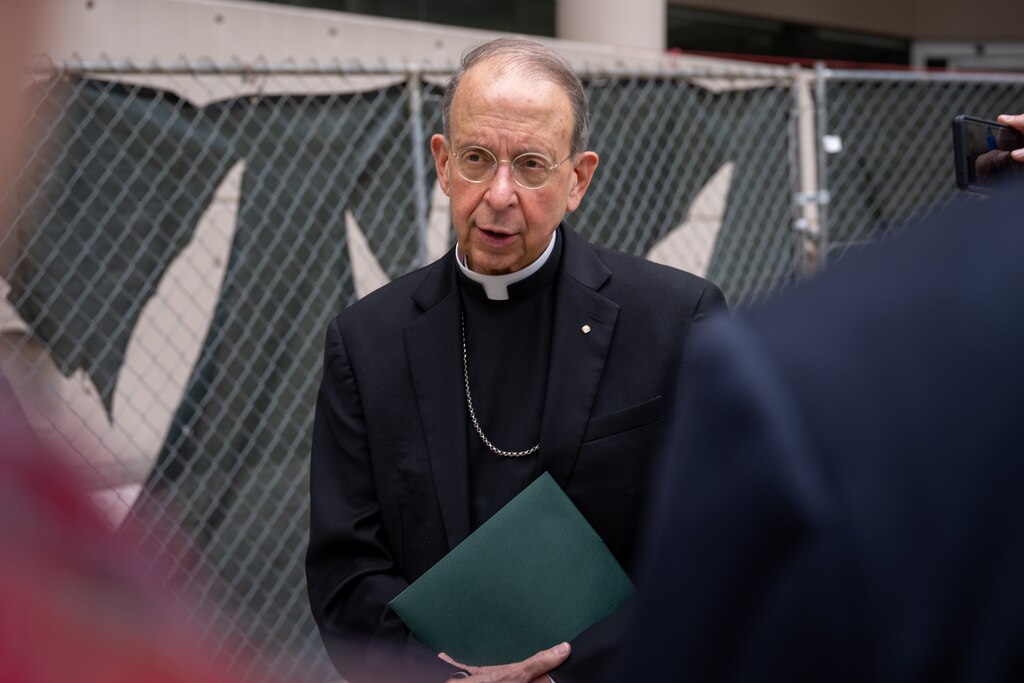Lawyers for more than 1,000 people who filed claims in the Archdiocese of Baltimore bankruptcy case alleging that church employees sexually abused them as children are scrambling to sue ahead of a May 31 deadline that limits their potential damages.
Heeding a request from a committee that represents survivors, U.S. Bankruptcy Judge Michelle M. Harner recently issued an order that temporarily allows survivors to file lawsuits in state or federal court.
“Every minute is critical to preserve the rights of survivors,” an attorney for the committee, Edwin Caldie, told Harner last week at a hearing. “Hundreds of millions, if not more, could simply evaporate.”
That’s because Maryland lawmakers this spring amended the Child Victims Act of 2023, which eliminated time limits for people sexually abused as children to sue their abusers and the institutions that enabled their torment. Legislators reduced the maximum amount of damages that survivors can win.
The Baltimore Banner thanks its sponsors. Become one.
The Maryland General Assembly revisited the law after it became clear that the state could be facing billions in liability. As many as 5,500 people who reported that they were abused in the juvenile detention system have filed claims or planned to take legal action.
Lawmakers slashed the cap for damages against the state from $890,000 to $400,000, and from $1.5 million to $700,000 against private institutions. The changes will apply to claims filed on or after June 1.
Because the archdiocese filed for bankruptcy days before the Child Victims Act of 2023 took effect, people who endured abuse in the church were not allowed to sue.
Harner is now allowing them to file lawsuits in the event the bankruptcy falls through, ensuring they would be eligible for the original, higher amount of damages.
Frank Natale, senior litigation counsel for Slater Slater Schulman LLP, in a statement described the ruling as a “critical lifeline” for survivors.
The Baltimore Banner thanks its sponsors. Become one.
“We remain extremely troubled, however, that it was necessitated by the eleventh-hour amendments to the Child Victims Act, which was already deemed constitutional by the Maryland Supreme Court,” Natale said. “These reductions, which slash compensation for victims across both public and private institutions, will disproportionately impact vulnerable populations, including many people from marginalized communities who have already endured unimaginable trauma.”
Robert Jenner, an attorney who represents approximately 100 survivors in the bankruptcy case, called meeting the filing deadline “Herculean,” adding that the amount of work was stretching the staff of his small law firm to its limit.
“There’s a greater cost here and that is the cost to survivors,” Jenner said. “Survivors need to come forward at their own pace in order not to be re-traumatized.”
Under the time crunch, he added, survivors are fielding frantic calls from their attorneys and relaying “horrific memories” in an “almost bureaucratic manner.”
“It’s horribly re-traumatizing,” Jenner said.
The Baltimore Banner thanks its sponsors. Become one.
The order on June 1 reinstates legal protections for the archdiocese and related entities. The ruling also essentially freezes the lawsuits after they’ve been filed to allow the bankruptcy case to continue.
If the bankruptcy case is settled and survivors are compensated, the lawsuits would become moot.

But Harner has expressed concerns about an apparent lack of progress in the case, which is currently in mediation.
“I am becoming increasingly concerned by the delay and the rhetoric in this case,” Harner told the attorneys in court. “I have no intention of letting any party use a bankruptcy case, including this Chapter 11 case, as both a shield and a sword.”
In a statement, Christian Kendzierski, a spokesperson for the archdiocese, said it remains committed to “working in good faith with all parties cooperatively and as expeditiously as possible toward the achievement of our shared goals.”
The Baltimore Banner thanks its sponsors. Become one.
Robert A. Gordon, a former U.S. Bankruptcy Court judge in Maryland who now teaches at the University of Maryland Francis King Carey School of Law, said Harner was “sending a precise message” to the archdiocese, which along with its insurers pushed back on a request from survivors to file lawsuits.
Harner is stating that the church needs to come up with a proposed resolution to the bankruptcy “or else, the lawsuits might be unleashed,” Gordon said.
Members of the Maryland chapter of the Survivors Network of those Abused by Priests, or SNAP, on Wednesday held a news conference outside the Edward A. Garmatz U.S. Courthouse in Baltimore and accused the archdiocese of engaging in stall tactics.
They also criticized the church for invoking an old legal defense called the “doctrine of charitable immunity” to maintain that it is not responsible for paying any abuse claims that are not covered by insurance.
David Lorenz, who heads the Maryland chapter of SNAP, urged survivors ahead of the deadline to file lawsuits in case the bankruptcy falls apart.
The Baltimore Banner thanks its sponsors. Become one.
“It’s a safety net,” Lorenz said. “If bankruptcy stays and it just moves through, doing that will really have no effect.”
But Lorenz said if the bankruptcy case is dismissed, “then you’re going to be left with the limits of when you filed your claim in civil court.”




Comments
Welcome to The Banner's subscriber-only commenting community. Please review our community guidelines.